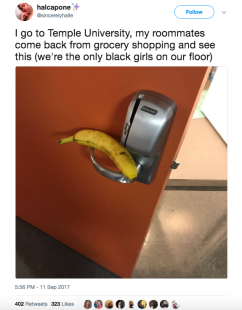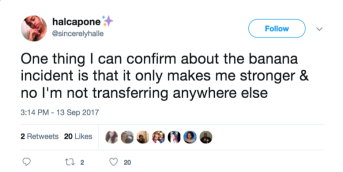“I go to Temple University, my roommates come back from grocery shopping and see this (we’re the only black girls on our floor).”

A tweet was sent out by freshman Halle Ray on Sept. 11 and was instantly shared by hundreds.
“I don’t want people to feel like they are disliked because of their skin color; it should never be that way,” said Ali Simon, a junior studying early childhood education at Temple University.
The university took action right away, starting an investigation. The National Association for the Advancement of Colored People (NAACP) on campus sent out a letter concerning the event.
“This behavior is unacceptable and the Progressive NAACP does not condone it in any way, shape or form. Claims that we live in a country that is post-racial are delegitimized quite often and this event serves as an example of that,” the letter said.
Later in the week, another banana was found on a door in the same building.
Police have not released many details but have identified someone they believe that may be responsible. Investigations, however, are still in process.
“I just wanted people to be aware that stuff like this does happen, especially if you are a minority or a (predominantly white institution),” Ray said to The Temple News.
While many would expect Ray to feel uncomfortable on campus and to consider leaving the school, she says she is not going anywhere.

On Sept. 13, Halley Ray tweeted, “One thing I can confirm about the banana incident is that it only makes me stronger and no I’m not transferring anywhere else.”
Doriana Markovitz, a sophomore studying African studies and women’s studies and member of the Black Student Union on Temple University’s campus, commented about the tweet, referring to the response as a necessary one.
“I think that it is courageous of her to make that statement clear to everyone. We live in a country where white men exist at the top,” Markovitz said. “For her to own that statement and make it clear that she will not let him push her out of a space— that she has the right to just as much as anyone else— is brave in my book.”
After hearing Cabrini’s story concerning racism, Ray said, “We had a banana put on our door and that girl [at Cabrini] had a racial slur on her door, basically telling her she was not welcomed. These things aren’t a brush off the shoulder. They matter. Everything is being called out now and nothing is going unnoticed.”
Reflecting on what is happening on Cabrini University’s campus, Ray wanted to send a message to the ones affected by the events.
Ray said, “Keep pushing through and do not let what they said/did impact why you came there in the first place if you’re a person of color and feel outnumbered because you’re a minority. You are helping your institution by being there.”
Temple is scheduled to have a Town Hall Meeting soon, but Ray is not interested in going when it is scheduled. The Temple story is still under investigation.
Markovitz said, “Racism is not new. It is not a rare occurrence. It is something that is alive and well in this country, no matter where you are. It is not unusual at a PWI for minority communities to face these kinds of injustices and discriminatory acts. It does make us stronger and it does shine a light on racial inequality and its prevalence in this country.”
Markovitz continued and said, “Truth be told, situations like this make me realize how racism does not just hurt the victim but it hurts the perpetrator too. I think we need to think about how we are going to punish those who did this. Can we take time to talk to them about why this is not okay— about the history and connotation behind it?”
“Racism is a disease, so it needs to be tended to as one,” Markovitz said.



